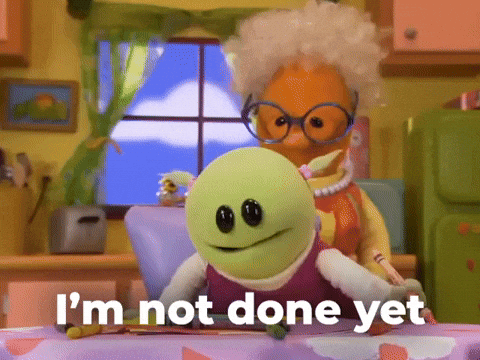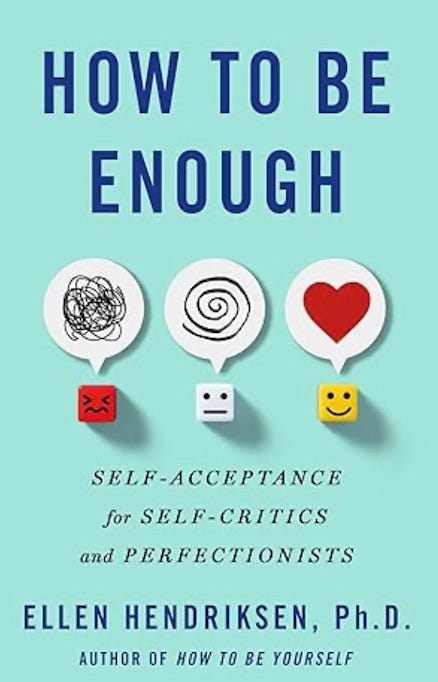How to handle chronic dissatisfaction
Are you actually falling short? Or are you just wired to think you are?
How to Be Enough (and its author) made an appearance on CBS Mornings! Here’s me boiling down the entire book into 4 minutes!
Also, check out two interviews with podcast hosts working hard to bring you interesting, well-thought-out topics: Lisa Nicole Bell’s Behind the Brilliance and Jonathan DeYoe’s Mindful Money.
With that, on with the newsletter!
Dear reader Amy wrote in and told a story that may feel familiar:
When I was a gifted kid, top of my class, people expected me to contribute to humanity in some large way, and now I find that I am the same smart person but living what feels like a small and unimportant life. What happened? Is it too late for me?
I’ve heard similar sentiments from other readers and clients alike:
“I worry I’m not reaching my potential.”
“"I feel like I'm capable of more, but I'm not sure how to get there."
"There's this nagging sense that I'm falling short of what I could be."
"I’m afraid I’m playing small when I should be going bigger."
Chronic dissatisfaction is part of perfectionism. If perfectionism means never feeling good enough, the natural resulting emotion is dissatisfaction. It makes sense: those of us familiar with perfectionism tend to focus on what’s left undone rather than what was accomplished, or the path we should have taken rather than where we are today.
How to handle chronic dissatisfaction? Let’s pull the acceptance lever twice and the change lever once with the following three tips. We’ll start with some acceptance:
1. Reflect inward: Know your personality
Our life satisfaction—defined as our opinion about how our life is going—is not objective. It’s influenced by lots of factors—our gender, age, but most of all, our personalities. Indeed, we don’t see the world as it is, we see the world as we are.
Having a perfectionistic personality can both help and hurt. In one study, the helpful side—setting high standards and striving for excellence—was linked to higher life satisfaction. The decidedly less helpful side—worrying about mistakes and fearing others’ judgment—was linked to lower life satisfaction.
But knowledge is power. Interestingly, knowing we’re simply wired to be a little unsatisfied can help us take our feelings of dissatisfaction less literally, which, paradoxically, can make us happier and more satisfied.
In my own experience, I gain perspective when I chalk up a tendency to genetics, wiring, or fate. “Oh, there are those Hendriksen genes,” or “Hey, there’s that dissatisfaction I tend to feel—thanks, 1990s you-can-do-anything upbringing!”
A good analogy: living with some chronic dissatisfaction is like carrying a book everywhere—it can be a little inconvenient at times, but not really. Books are pretty easy to carry.
Most importantly, we don’t have to read the book. We don’t have to believe the story the book tells us. We just carry it while we go do the things that are important to us.
2. Reflect outward: Examine your environment, both past and present.
Every human reacts to the situations they’re put in. Like our dear reader Amy, maybe you experienced a program, school, or profession where, subtly or overtly, you were supposed to be a “leader of tomorrow”? (Search #giftedkidburnout on social media to find your kinfolk.)
Similarly, did your family expect a lot of you? Maybe you had immigrant parents who needed to build security and respect in a new country. Maybe your family was acutely aware of the opinions of others.
No matter the exact circumstance, many adults realize that growing up with the expectation to “contribute to humanity in some large way" left them reliant on external achievements and the approval of others. It's part of the package deal of growing up in the environment and family you came from.
Let’s also look at the present: simply living in 2025, where the pressure to be our “best self” implies that simply being our self is inadequate, is enough to make anyone feel dissatisfied. It’s a normal, human response to a high-pressure, high-expectation past or present.
But dissatisfaction conferred by your past or present doesn’t define your future. Rather than taking the thoughts to heart ("Now I really need to do something with my life!") or trying to change them ("I should just be happy with my life. I have nothing to complain about,") we can change our relationship to them: ("Oh, there's my first generation inadequacy again. This is a normal response to those expectations.")
Okay, those were two acceptance-based reflections. Now, let’s pull that “change” lever:
3. Rethink “finish line” thoughts like, “If I can just get to X, then I’ll be done.”
A client we’ll call Molly insists that if she can just get tenure at the university where she’s currently an entry-level professor, then she will have achieved “success” and can finally relax.
Other “and then I can stop” goals often include:
“If I can just hit my goal weight…”
“Once I find my life partner…”
“I just need to get this degree…”
“After I get through this giant project…”
Unfortunately, what happens when we hit that milestone? Generally one of three things:
We realize we’re actually at another starting line:
“I got my PhD, but now I have to start building a career.”
“Whew, I got through that pregnancy. Wait, now I have to raise this kid.”
We move the goalposts:
“Well, now I should run another marathon five minutes faster.”
“Well, that project is done. What do I have to do next?”
We realize with a slap of disillusionment that success doesn’t deliver the happiness and self-worth we thought it would.
“I thought making six figures would make people respect me.”
“Why don’t I feel happy? I have the family and home I always wanted.”
Remember that “finish line” thoughts are tempting. They “work” because they can motivate us to keep going temporarily. But reaching the goal won’t fundamentally change how we feel about ourselves.
Don’t get me wrong—goals are good. Please do keep setting goals that are important to you and working to achieve them.
While you do this, be kind to yourself. In scientific language, self-compassion “fully mediates the relationship between maladaptive perfectionism and life satisfaction.”
In plain language, that means problematic perfectionism makes us dissatisfied with our lives, no matter what we’ve achieved.
But when you add in self-compassion, that direct link disappears. Perfectionism only makes us dissatisfied with life because it lowers our self-compassion.
And self-compassion is something we can change.
Next newsletter will be (you guessed it!): How to increase compassion for yourself!
If How to Be Enough made you laugh, think, reflect (or procrastinate on something else), an honest review on Amazon will spark the same for someone else.
If you received this newsletter from a friend, sign up for more (hey, there’s a button right there) or at ellenhendriksen.com.
Be kind to others and yourself!











So useful, as always!
Thank you! I so needed this today (even after having read and loved the book)